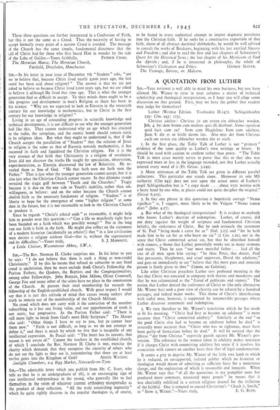A QUOTATION FROM LUTHER
SIR,—Your reviewer is well able to mind his own business, but you have allowed Mr. Wiener to raise in your columns a matter of technical scholarship and theological interpretation, so I hope you will allow some discussion on that ground. First, may we have the gobbet that readers may judge for themselves?
Luther (Weimar Edition. Tischreden 11.1472. 'Schlaginhaufen 239: Clm. 943: 175).
Christus adulter: Christus ist am ersten ein ehbrecher worden. Joh, 4. bei dem brunn cum muliere quia illi dicebant. Nemo significat quid facit cum ea? Item cum Magdalena Item cum adultera. Joan. 8. die er so leicht davon lies. Also mus der from Christus auch am ersten ein ehbrecher werden ehe er starb.
t. In the first place, the Table Talk of Luther is not " primary " evidence of the same quality as Luther's own writings or letters. It should be used with caution to confirm rather than prove. " The Table Talk in most cases merely serves to prove that this or that idea was expressed more or less in the language recorded, not that Luther actually uttered every word of it (Fr. Grisar. 3.249).
2. Many utterances of the Table Talk are given in different parallel collections. This particular one stands alone. Moreover its sole MS authority (Clm 943) does not rest upon the actual notes of Luther's pupil Schlaginhaufen but is "a copy made . . . about 1551 written with a hasty hand by one who, in places could not quite decipher the original." (Grisar 6.5o5).
3. In fact one phrase in this quotation is hopelessly corrupt "Nemo significat " is, I suggest, more likely to be the Vulgate " Nemo tamen dixit " (John. 4.27).
4. But what of the theological interpretation? It is evident to anybody who knows Luther's doctrine of redemption. Luther, of course, did not deny (against the weight of scripture and fundamental Christian beliefs), the sinlessness of Christ. But he took seriously the statement of St. Paul " being made a curse for us " (Gal. 3.13) and " for he hath made him to be sin for us who knew no sin " (2 Cor. 5.2o), not in the sense that Christ committed actual sin, but that he identified himself with sinners, a theme that Luther powerfully works out in many sermons and tracts. Thus he says "our most merciful father . . . laid all the sins of all men upon him saying: "be thou Peter, that denier, Paul that persecuter, blasphemer, and cruel oppressor, David the adulterer," and goes on immediately to say " believe that this most pure and innocent person is freely given to thee " (Comm. on Galatian).
Like other Christian preachers Luther sees profound meaning in the fact that Christ was executed in company with thieves and murderers and that he was calumniated as the " friend of publicans and sinners." The notion that Luther denied the sinlessness of Christ or (the only alternative Mr. Wiener has) took a poor view of chastity can be refuted by a hundred passages, and indeed major works. This theme of Christ's identification with sinful men, however, is supported by innumerable passages where Luther discusses atonement and redemption.
5. We turn therefore to Mr. Wiener's translation which he has made to fit his meaning. " Christ had first to become an adulterer " is more accurate than "Christ committed adultery." Similarly at the end " so the good Christ also had to become an adulterer before he died " is assuredly more accurate than " Christ who was so righteous, must have been guilty of fornication before he died." It will be noticed that the phrase " der from Christus " expressly guards against Mr. Wiener's per- version. The reference to the woman taken in adultery makes nonsense if it charges Christ with committing adultery but sense if it involves his association with sinners on another basis than that of legal condemnation.
It seems a pity to deprive Mr. Wiener of the little ewe lamb to which he is reduced, an unsupported, isolated gobbet which no historian or theologian would dream of admitting as sufficient basis for a monstrous charge, and the explanation of which is reasonable and innocent. When Mr. Wiener says that " of all the quotations in my pamphlet none has produced more comment, nauseated more people " he means that it was charitably exhibited in a certain religious journal for the titillation of the faithful. One is tempted to amend Chesterton's " Chuck it, Smith,"
to " Stow it, Wiener."—Yours truly, E. G. RUPP.






























 Previous page
Previous page